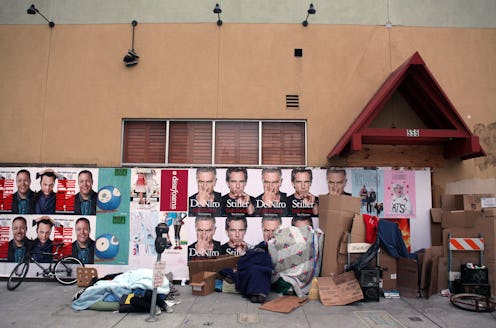News
How The Tech Industry Could Be Making Homelessness On The West Coast Even Worse

For the first time in seven years, the homeless population in the United States increased by 1 percent this year. While that doesn't sound like much, the bump came from a surge of homelessness concentrated in California, Oregon, and Washington. The soaring number of homeless people on the West Coast has led to at least 10 states of emergency in various cities and counties in the past two years.
From San Diego to Seattle, officials suggest that a lack of affordable housing thanks to the tech industry's boom could be the cause. As white-collar yuppies move into increasingly gentrifying neighborhoods, the price for rent and homeownership rockets in these areas, pushing out lower-income workers like retail clerks, plumbers, janitors, and teachers who can no longer afford the exorbitant rent. As the tech sector continues to grow, tent camps and hepatitis A outbreaks have sprouted up in recent years.
The report by the U.S. Department of Housing and Urban Development showed that the overall homeless population in the West Coast states grew 14 percent over the past two years, more than any other region. In Los Angeles County, for instance, the number of homeless people increased by 26 percent from 2016 to 2017, bringing the total homeless population to more than 57,000.
In Silicon Valley, The Nation reported in March that families were living in cars parked next to houses of tech startup executives. Last year, wealthy investors and members of the tech elite donated money to Proposition Q, an ordinance to clear out the sidewalk tent encampments. The ordinance passed and has mixed support.
Meanwhile, advocates and grassroots organizations are pushing for policy reform that protects employees as they believe the Silicon Valley housing crisis is linked to a job crisis. One such organization, Silicon Valley Rising, advocates for policies that mandate fair work schedules and living wage standards. For immediate solutions, the nonprofit Lava Mae provides shower access via mobile hygiene units.
Access to hygiene care could also help mitigate public health problems. San Diego is currently fighting a hepatitis A outbreak traced to the homeless population. A person contracts hepatitis A from eating or drinking something contaminated with the fecal matter, even tiny amounts, of an infected person. The city has resorted to scrubbing their sidewalks with bleach.
In Los Angeles, city officials are turning to existing buildings to shelter people. Los Angeles saw this year a rise in the number of homeless veterans despite an overall drop nationwide. But the city is home to at least 382 old motels with about 10,259 rooms. A plan is under discussion to convert the motels into temporary or supportive housing complexes.
Outside of California, the homelessness has become a dominant issue in cities like Seattle and Portland. Seattle City Councilman Mike O'Brien told WTOP:
I’ve got economically zero unemployment in my city, and I’ve got thousands of homeless people that actually are working and just can’t afford housing. There’s nowhere for these folks to move to. Every time we open up a new place, it fills up.
A survey by Portland news station KGW revealed 34 percent of Portlanders have considered moving out of the city because of the impact of homelessness on their daily lives. But the majority of those surveyed also supported building permanent shelters in Portland. Portland resident David Bangsberg, dean of the OHSU-PSU School of Public Health, advised in a letter to The Oregonian that the city should invest in "housing designed for hard-working but economically disenfranchised older adults — places that combine new economic opportunities that tap into their wisdom and experience to build stable, vibrant and intergenerational communities."
As advocates, policymakers and nonprofits attempt to solve the homelessness crisis on the West Coast, pressure is also mounting on tech companies to better support the workers who help the industry thrive.